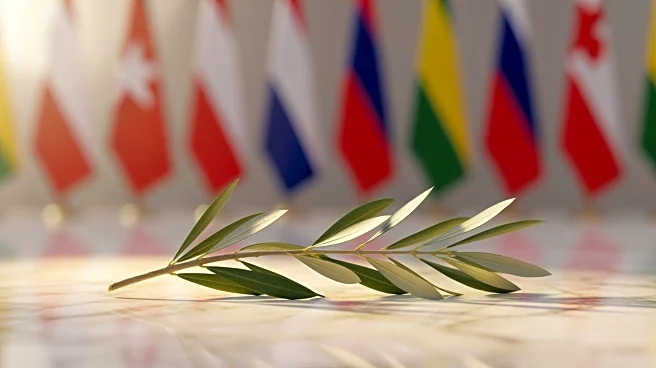What's Happening?
The U.S. State Department has announced the lifting of sanctions against Syria's interim president, Ahmed al-Sharaa, and Syrian Interior Minister Anas Hasan Khattab. This decision comes just days before
al-Sharaa's scheduled visit to the White House, marking a significant diplomatic development. The sanctions removal is part of a broader effort to recognize Syria's transition to a new political chapter. Al-Sharaa, who has been on the sanctions list since 2013, will be the first Syrian president to visit Washington since Syria's independence in 1946. The move is seen as a strong political signal, indicating a shift in U.S. policy towards Syria.
Why It's Important?
The lifting of sanctions on Syrian President Ahmed al-Sharaa is a pivotal moment in U.S.-Syria relations, potentially signaling a thaw in diplomatic ties. This action could have significant implications for U.S. foreign policy in the Middle East, affecting regional stability and international relations. By removing al-Sharaa from the sanctions list, the U.S. is acknowledging Syria's political transition, which may lead to increased cooperation and dialogue between the two nations. This development could impact U.S. interests in the region, including security, humanitarian aid, and geopolitical strategy.
What's Next?
Following the lifting of sanctions, President al-Sharaa's visit to the White House is expected to further diplomatic discussions between the U.S. and Syria. This visit may pave the way for future negotiations on various issues, including peace efforts, economic cooperation, and regional security. Stakeholders such as international organizations, neighboring countries, and political leaders will be closely monitoring the outcomes of this visit. The U.S. may also consider additional policy adjustments based on the progress of these discussions.
Beyond the Headlines
The decision to lift sanctions on Syria's interim president could have deeper implications for international diplomacy and U.S. foreign policy. It raises questions about the ethical considerations of engaging with regimes previously under sanctions and the long-term impact on human rights advocacy. This move might also influence other countries' approaches to Syria, potentially altering alliances and power dynamics in the Middle East.










